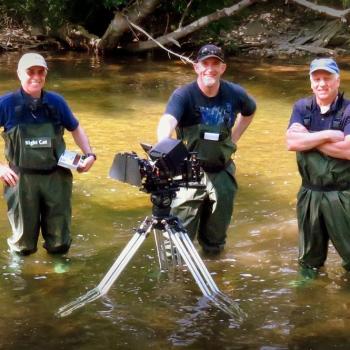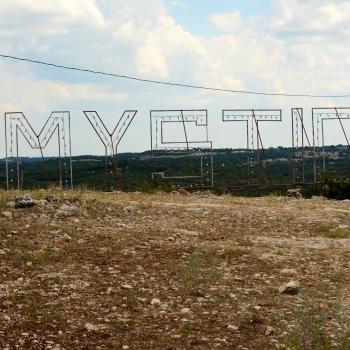As I write this, Harold Camping is speaking to the press in the wake of his failed prediction that the rapture would occur on May 21, 2011. I have been amazed at how Camping's false prophecy has become a cultural and media event. On Saturday night I was doing a book signing in Wilkes-Barre, PA and the entire staff at the Barnes & Noble could not stop commenting on the impending rapture. A fierce debate raged among the salespersons at the "Nook" table as to whether the great earthquake Camping predicted would take place at 6:00 p.m. Eastern Standard Time or 6:00 p.m. Pacific Standard Time. This week I received e-mails and Facebook messages from family and friends soliciting my thoughts on the matter. The preacher I heard on Sunday morning made Camping's message the central theme of her sermon.
On Saturday night at 6:00 p.m. EST I was sitting in my car in the parking lot of a Panera Bread restaurant in Wilkes-Barre watching a man and a woman in the nearby parking lot of an Outback Steakhouse. They were looking into the sky. I have no idea why there were gazing in this way. Maybe they were watching a plane fly overhead. Perhaps they were noticing a unique cloud formation. But it sure looked like they were waiting for the rapture. At about 6:03 p.m. they stopped staring at the heavens, chatted with each other for a few seconds, and then headed into the restaurant, presumably to get their dinner. If they weren't going to get their rapture, at least they could get a blooming onion.
As a historian, I've found the hype surrounding Camping's prediction fascinating. If I were living one hundred years from now, I would probably be asking the following questions:
- Why did Camping's rapture prediction strike a chord with so many Americans? What was the demographic make-up of the people who believed him? What was the relationship between the current economic downturn and these end-time longings? Were most of Camping's followers uneducated? What parts of the country did they come from?
- What does the fact that Camping was mocked so mercilessly and adamantly by non-Christians and Christians alike tell us about American culture and its relationship to religion in early 21st-century America?
- How did the wildly popular Left Behind novels, written by Tim LaHaye and Jerry Jenkins, set the cultural stage for this specific rapture prediction? A colleague of mine recently reminded me of the large number of television shows and movies that focus on the end of the world and apocalyptic themes, including The Road, The Day After Tomorrow, and even The Lord of the Rings andthe Harry Potter series.
As a Christian, I approach the whole Camping saga in a different way. Harold Camping was clearly misguided and should, in some way, be held accountable for leading so many people astray. Those who are fed up with the cult of personality and the Left Behind theology so prevalent in American evangelicalism have my sympathy. I can understand why so many of my fellow evangelicals no longer want to be associated with this movement any longer. Thoughtful Christians see Harold Camping and those like him as harmful to the cause of Christianity in the world. I don't disagree.
But at the same time it is a fundamental belief of historic Christianity—Catholic, Orthodox, Evangelical, Mainline Protestant—that Jesus will one day return. Christians should not throw out the baby with the bathwater. Camping is deluded. Many Christians do not buy into the rapture theology he is selling. But to identify oneself as a Christian one must affirm a belief in the Second Coming. This, after all, is where we place our hope. This is the belief that gets us through day. As Christ rose, we will also rise.
I hope that Christian intellectuals, Christian academics, and Christian scholars will remember this, because, frankly, we don't talk about it that much. What might our vocations mean if we took seriously Jesus' words in the Lord's Prayer, "Thy kingdom come, thy will be done"? How might Christian intellectual life change in light of the words of the Apostles' Creed, "He will come to judge the living and the dead"?
For the Christian, history is not defined as the unrelenting march of human progress. Instead, it has a definitive telos—an end, a fulfillment—that is bound with the kingdom to come.
5/24/2011 4:00:00 AM




